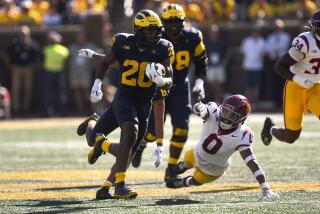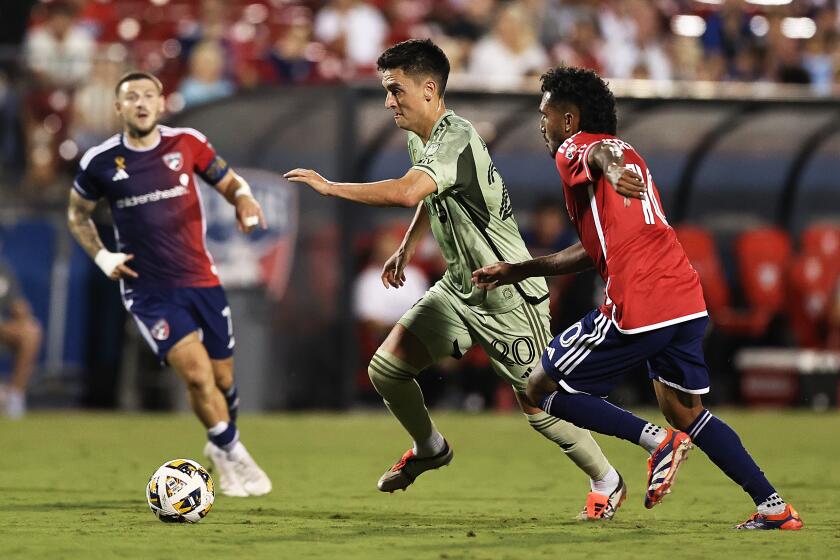Former NFL Player Is Killed in Afghanistan
He was a nonconformist and a surfer dude, a football star and a scholar -- a 27-year-old with fame and fortune who traded both for life in a war zone.
On Friday, Pat Tillman was mourned as a fallen fighter in the war on terror and hailed as a hero who forsook celebrity in a society obsessed with it -- one who walked wordlessly away from the life of a National Football League millionaire and paid the ultimate price.
Tillman was killed in a firefight Thursday evening in southeastern Afghanistan when his Army Ranger patrol was ambushed near the village of Sperah, about 25 miles southwest of Khowst, the Pentagon confirmed Friday night. He was the only American soldier killed in the shootout. Two others were wounded, and an Afghan government soldier was killed.
Tillman was part of the elite 75th Ranger Regiment of Fort Lewis, Wash. Friends said he declined to be interviewed about his decision in 2002 to leave the NFL’s Arizona Cardinals and enlist because he did not want to distinguish his sacrifice from those made by other troops.
He was lauded at the White House, where a statement called him “an inspiration both on and off the field.”
On Capitol Hill a fellow Arizonan, Republican Sen. John McCain, said he was “heartbroken” by the news.
“The tragic loss of this extraordinary young man will seem a heavy blow to our nation’s morale, as it is surely a grievous injury to his loved ones,” McCain said.
Many American families have suffered the same sacrifice, McCain said. “But there is in Pat Tillman’s example, in his unexpected choice of duty to his country over the riches and other comforts of celebrity, and in his humility, such an inspiration to all of us to reclaim the essential public-spiritedness of Americans that many of us, in low moments, had worried was no longer our common distinguishing trait,” he added.
Tillman enlisted with his younger brother Kevin, a minor league baseball player in the Cleveland Indian organization.
Pat Tillman turned down a $3.6-million contract offer from the Cardinals, where he played four seasons after starring in football at Leland High School in San Jose and Arizona State University.
The brothers graduated from Army Ranger school in late 2002 and were deployed to the Middle East. They received the Arthur Ashe Courage Award from ESPN last year in Los Angeles -- an honor accepted by the youngest of the three Tillman boys, Richard, who attended the awards show with parents Pat Sr., an attorney, and Mary, a teacher.
On Friday morning, motorists honked as they drove past Sun Devil Stadium in Tempe, Ariz.
One person rolled down his window and screamed, “Go Pat!” said Mark Brand, associate athletic director at Arizona State, where flags flew at half-staff.
“We have been flooded with e-mails, voice mails, people that are not even football fans,” Brand said.
Tillman enlisted shortly after returning from his honeymoon in Bora Bora with his wife, Marie, whom he dated at Leland High. They had no children.
While many pro athletes served in World War II and Korea, when a military draft was in place, Tillman was one of the few to interrupt a lucrative career to volunteer for war, especially since the Vietnam War, and his death places him in even rarer company. According to the Pro Football Hall of Fame, 21 active or former players were killed during World War II and two in Vietnam.
Tillman became one of more than 100 American soldiers killed in the line of duty during Operation Enduring Freedom, which began in Afghanistan in October 2001.
He was on a routine combat patrol as part of Operation Mountain Storm, part of a combined spring offensive by U.S. and Afghan troops to flush out and kill or capture Taliban and Al Qaeda forces believed to have spent the winter bivouacked along the Afghan border with Pakistan.The Rangers, named for the men who “ranged” the American frontier to protect settlers, are an elite special operations unit trained to handle some of the military’s most difficult missions, including the raid on Taliban leader Mullah Muhammad Omar’s home in 2001.
“When [Pat] first came to talk to me about his decision, he said, ‘There are men and women all over the country doing this,’ ” recalled Dave McGinnis, a Tennessee Titan assistant coach who was Arizona’s head coach when Tillman left.
“He never really saw himself as unique or special.”
But to those who knew him, Tillman was one of a kind -- a meticulous thinker, modest friend and ferocious tackler -- who rode a beach-cruiser bicycle to practice and let his long hair spill over his shoulders.
“I’ve been in this business for 25 years,” said Brand, the Arizona State official. “He’s the first person I have ever seen who came to college for four years and the college learned from him.”
Tillman downplayed his achievements in the classroom at Arizona State, where he graduated summa cum laude in 3 1/2 years with a 3.84 grade-point average in marketing.
“I’m definitely proud of that,” Tillman said in a 1997 interview. “But I don’t think it’s something that needs to be shouted from the rooftops.”
When Sports Illustrated visited the campus in 1996, the photographer wanted a shot of him bench-pressing a stack of books. Tillman balked, instead posing for a photo atop one of the Sun Devil Stadium light towers, a favorite thinking spot for him. Tillman had climbed it barefoot.
Noted for his toughness, the 5-foot-11, 200-pound Tillman not only survived as an undersized linebacker in the Pacific 10 Conference but was named the conference’s defensive player of the year in 1997.
Born Nov. 6, 1976, in San Jose, Tillman graduated early from Arizona State and played four seasons in the NFL beginning in 1998. He set a Cardinal record in 2000 with 224 tackles and was widely considered one of the team’s inspirational leaders.
Tillman switched from linebacker to safety when he turned pro and beat long odds just to make the roster as a seventh-round draft pick.
As a rookie on the second day of training camp, he flattened a starting fullback who outweighed him by 50 pounds, injuring the teammate during what was supposed to be a routine drill.
“I always looked at Pat as invincible,” said Tillman’s friend, Ryan Tollner, son of former USC football coach Ted Tollner. “Pat could do anything he ever wanted to do. Nothing he ever did surprised me. Even the move to join the Army. Pat Tillman lived a heroic, legendary life.”
Bruce Snyder, former head coach at Arizona State, said he believed Tillman would capture Osama bin Laden.
Tillman “had the intellect to me, the courage and the toughness to be president of the United States,” Snyder said. “He was mysterious in a way. He was a surfer dude, he was a renegade, he was an intellectual, he was a vicious hitter, he was compassionate.”
In the Almaden Valley area of San Jose, flags flew at half-staff at Leland High.
After classes began Friday, no announcement was made to the students about Tillman’s death, in accordance with the wishes of his parents, said assistant principal Bob Setterland.
“The family has asked us to make as little of it as possible,” he said. “Their feelings are that a lot of great young people have died in the service of their country and it would be wrong singling one out.”
Dan Lloyd was defensive coordinator of the Chargers when Tillman was a senior in 1993.
Lloyd remembered that during Leland High’s first-round playoff game in Tillman’s senior year, Tillman would sneak back onto the field because he enjoyed the competition so much, even though the game was a rout for the Chargers.
“We finally had to take his shoulder pads away,” Lloyd said.
“I hope to God he was doing what he wanted to do when it happened to him,” Lloyd added. “I was fortunate to coach him. Even so, we got this little, tiny bit of him.
“Almaden Valley is small and Pat was very popular. People here know each other. He represented what was good in this valley.”
Despite the wealth his pro career brought him, Tillman maintained the lifestyle of a college kid just scraping by.
While other rookies rolled around in BMWs and Land Rovers, Tillman pedaled to practice. He never bought a new car and only later in his pro career splurged for a used Volvo station wagon.
“If somebody says, ‘Those are the neatest shoes I’ve ever seen,’ he’ll buy the exact opposite ones. In purple. Just to prove he wouldn’t cave in to fashion trends. He’s an original,” Jeff Hechtle, a boyhood friend, told The Times in a 2002 interview.
He added: “He values his relationships more than anything in his life. Relationships to Pat mean the world.”
Three years ago Tillman turned down a five-year, $9-million offer from St. Louis to stay with Arizona. He became a free agent in spring 2002 and was expected to re-sign with Arizona when he broke the news that he was enlisting. Friends say he planned to return to the NFL when his three-year military stint ended.
“He was so polite, so engaging,” Tollner said. “He had so much depth when you spoke to him. He was incredibly intelligent.”Every time I saw him or talked to him, he always left me thinking, ‘I wish I were better friends with this guy. I wish I knew him better.’ ”
In front of the Cardinal offices Friday, Tillman’s jersey was displayed in a glass case. A makeshift shrine had grown around it. Arizona State announced a scholarship in Tillman’s name at its business school and plans to retire his No. 42 jersey at the end of the 2004 season.
The jersey is now worn by Connor Banks, who was already well aware of Tillman’s legacy, but says he is now a changed man.
Said Banks: “I was more happy-go-lucky yesterday.”
Bonk reported from San Jose, and Hendren from Washington. Times staff writers Chris Dufresne and Rafer Weigel and special correspondent Gerard Wright in Phoenix contributed to this report.
More to Read
Go beyond the scoreboard
Get the latest on L.A.'s teams in the daily Sports Report newsletter.
You may occasionally receive promotional content from the Los Angeles Times.











